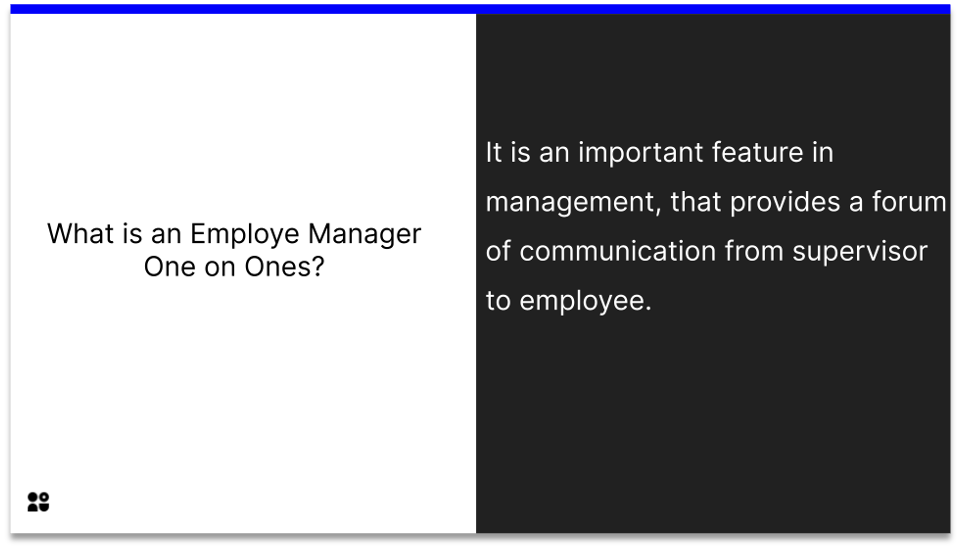Most people have worked in a teamwork environment in some sort of capacity, whether it be at work, in a social setting, or on the sports field. Some of us have had the pleasure of being part of a dream team, whilst others have suffered the experience of being part of a team with the cohesion capabilities of a fox in a chicken coop.
Nonetheless, partaking in both provides valuable teamworking lessons for all. For instance, poorly functioning teams usually lack communication, trust, and motivation. Whereas successful teams can operate effortlessly by offering mutual support to each other and delegate responsibilities constructively.
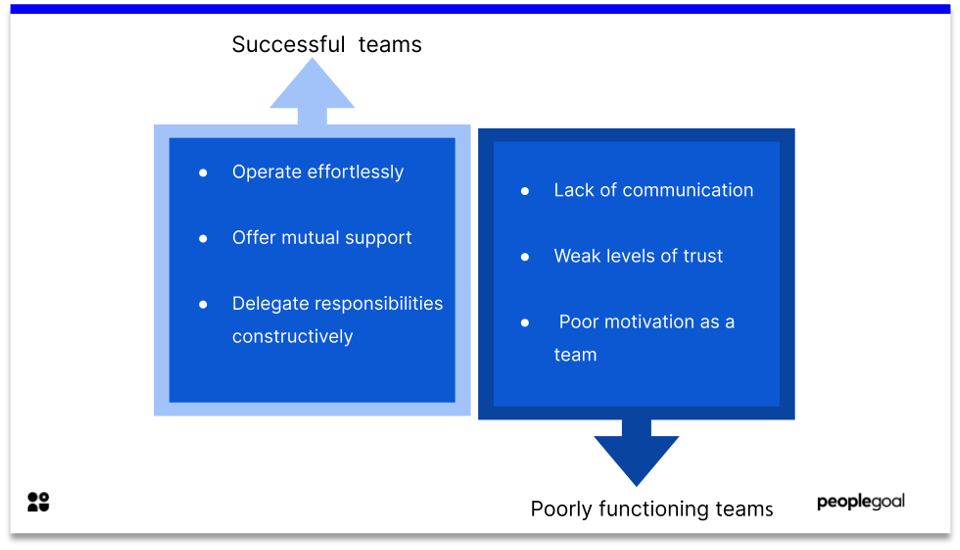
We’ve got 10 ways to help you create a culture of teamwork while working remotely.
Why is teamwork important?
The growing importance of successful teamwork within the working world is reflected in the huge surge in demand for team collaboration tools. This is in huge part due to the movement away from the traditional style of hierarchical, top-down distribution of work towards a flat, network-style organization. This in itself requires a high level of teamwork and, when executed correctly, can produce unrivalled productivity, creativity, and job satisfaction.
An environment in which teamwork is championed promotes an atmosphere of loyalty. Not only to the organization the individuals are working for, but also loyalty to their colleagues. To state the obvious, teamwork builds relationships which motivates employees to work harder to cooperate with one other – which is vital to a team’s success.
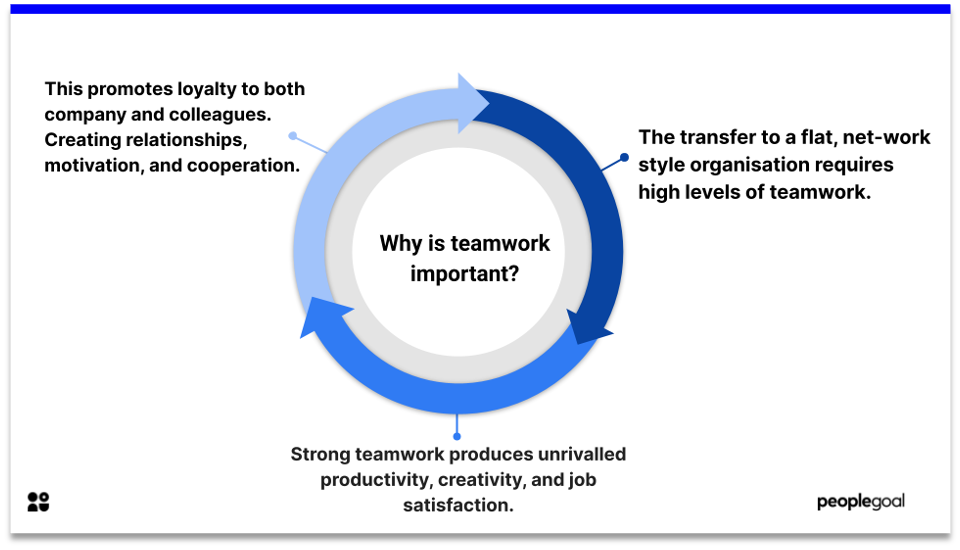
What this allows for is a diversification of talents, communication skills, strengths, weaknesses, and perspectives when working towards a common goal. With all this in mind, here are 5 more benefits of teamwork.
5 Benefits of Teamwork
1. Teamwork boosts happiness
I may be wrong, but from my understanding the majority of inhabitants on earth are on the pursuit of happiness. Studies have shown that employees who experience good teamworking traits such as open and honest feedback report higher levels of wellbeing.
Your employees’ happiness should be very important to you as it can directly impact your productivity. A study from the University of Warwick suggested that happy employees can be up to 20% more productive than unhappy employees.
So as an employer, why not give them a helping hand by investing time/expertise/money in team development and teamwork? And as an employee, why not help yourself and those around you by working on your teamworking skills.

2. Teamwork fosters creativity
Although many great ideas are credited tindividuals like Thomas Edison, he could not have brought his innovations to life without his team. He employed many people in his lab and ‘his’ inventions were really a team effort, with input from multiple minds in all areas.
In order to bolster creativity within your workforce you need to ditch the all-too-pervasive “idol” mentality, and develop your teamworking skills. The creativity potential that comes from teamwork can offer a diverse range of solutions to any issues you may be facing, or projects you are undertaking.
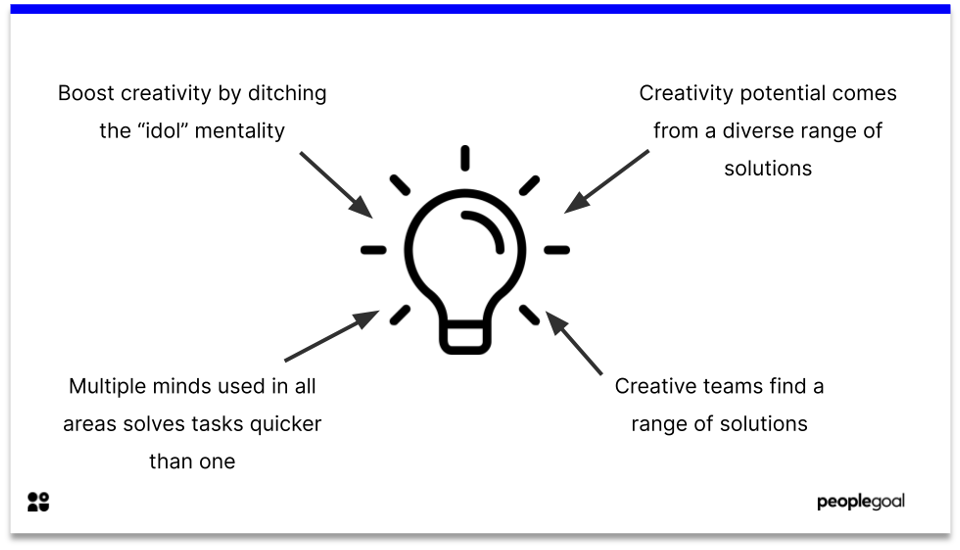
3. Teamwork reduces burnout
Studies have shown that over 40% of workers experience burnout at least once a year. Burnout is generally due to excessive workloads and little down time. One obvious way to reduce a workload is to share a workload.
Working as a team towards a common goal means providing each other with both emotional support and literal support with tasks. Therefore it’s crucial that managers are confident to delegate tasks. By separating an overall objective into separate tasks, individuals have the potential to grow by utilizing their strengths in new and exciting areas.
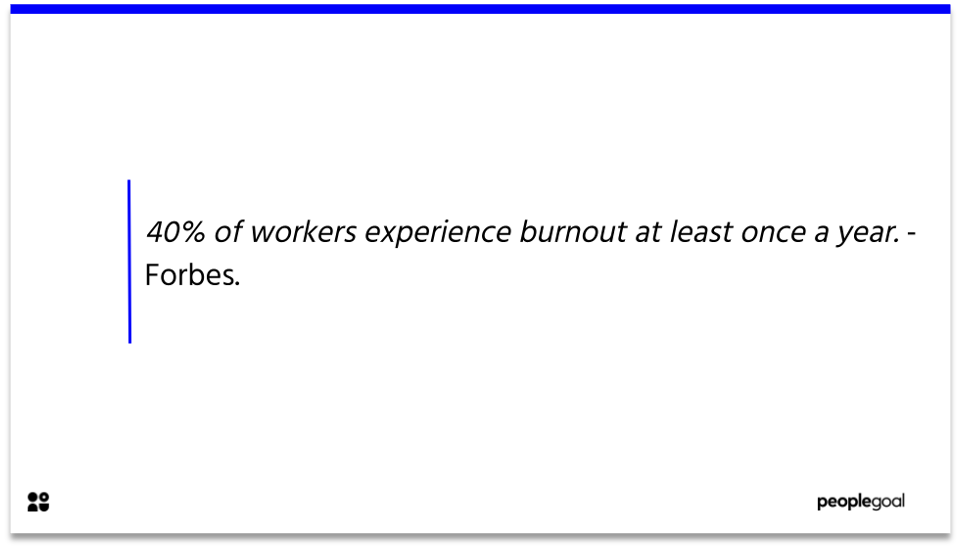
4. Teamwork increases productivity
Another vital aspect of high functioning teams is recognition. Recognition from managers is a great way to motivate employees to work, but even more so when it’s received from peers. Letting members of the team know when they have completed a task to great effect is a proven method of bolstering a community ethos in which employees are driven to not let their co-workers down, and thus complete their work to higher standards and more efficiently.
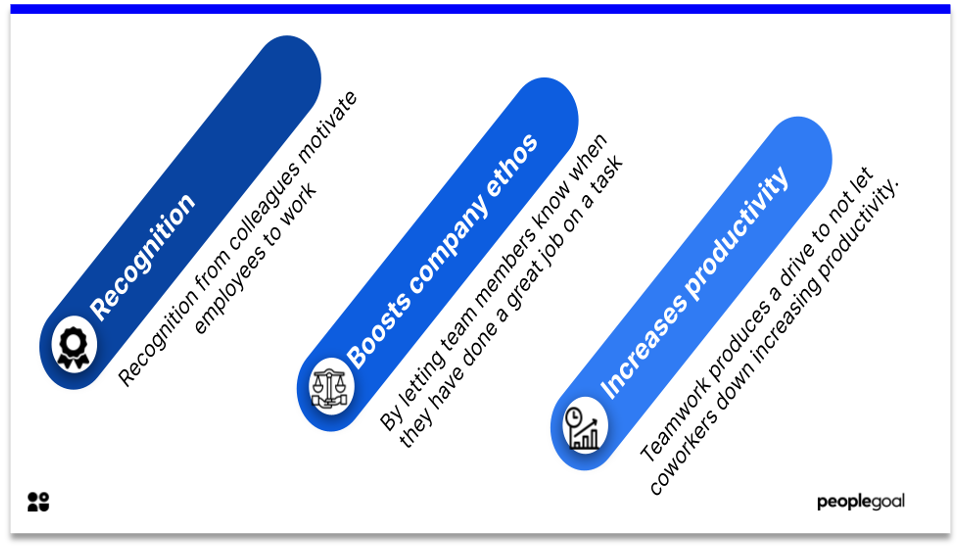
5. Teamwork encourages risk taking
Risk is usually associated with downfalls, however within business, it’s risk that produces the most disruptive organizations/products. Individuals are far less likely to take risks on their own as they will be individually responsible if the risk doesn’t pay off. Whereas if teams work together on a risk the responsibility is divided and people are more likely to try something new, and cause positive disruption/innovation.
The biggest risk is not taking any risk… In a world that is changing really quickly, the only strategy that is guaranteed to fail is not taking risks. – Mark Zuckerberg
10 Ideas to Create a Culture of Teamwork While Working Remotely
With this in mind, and the recent mass shift to remote working, it should be a top priority for all organizations to create a culture of teamwork while working remotely. However, this can be a tough task when you’re not physically present with your coworkers, with the ability to tap someone on the shoulder and ask them a question – or because you may not be able to read someone’s body language or feeling towards an idea without them being present. Therefore, we’ve put together a list of 10 ways to create a culture of teamwork while working remotely.

1. Continuous communication
Good communication is the foundation of all successful organizations. Whether it be in-person or digitally, you need to get communication right. When employees are working remotely they must have access to all the necessary tools to communicate with their colleagues effectively – from having the hardware such as a laptop and phone, to having communication software like Slack installed.
As much as instant messaging may be a blight for some, it’s necessary to undertake the most efficient work possible when working with others. However, it must be noted, that communication rules must be laid out clearly, and employees must not be left feeling they must constantly check their messages no matter what time of day it is.
If you maintain the working hours of 9-5, just because you haven’t left a physical office, you need to put a hard stop to your working day. So be clear that your employees can switch off!
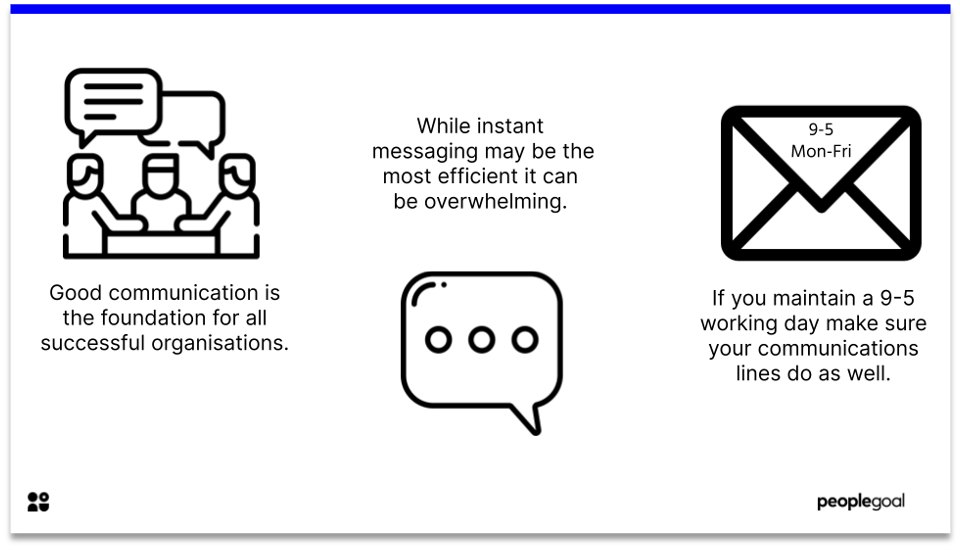
2. Visual communication
Even if you feel you are communicating well enough via email, Whatsapp, phone conversations etc., you should make a concerted effort to host video meetings on a regular basis. Some employees may be living and working alone, and could do with the comfort of seeing someone else’s face to remind them they are not communicating with robots.
Try hosting a weekly round-up with your teams, and a monthly conference with the whole business. These can have one speaker, or have many. But it’s a great way to make sure that everyone is kept in the loop and can socialize with those that they are working with.
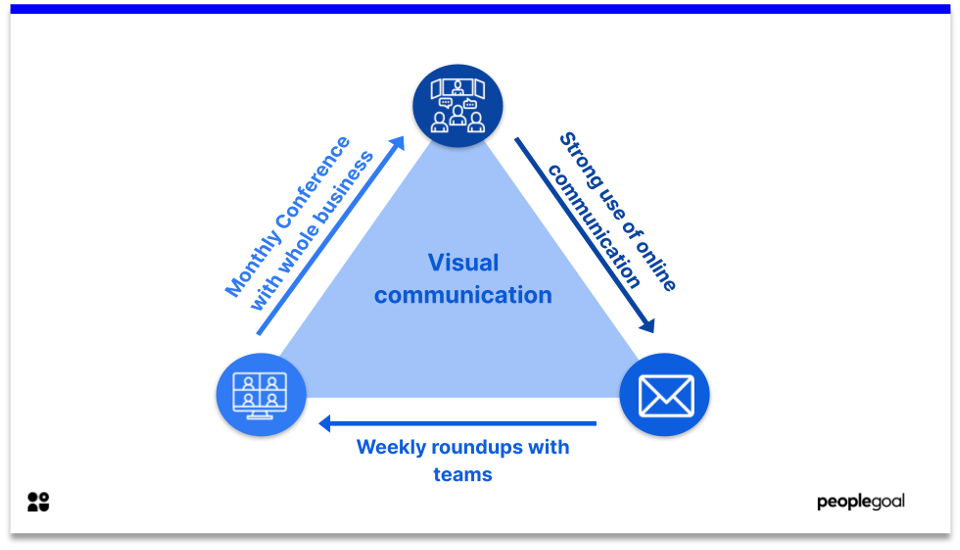
3. Coffee club
Even if you’re hosting regular business-related meetings via video call, you should still offer employees options to socialize during the working day (as they would in the office) to keep morale up. Create a coffee club meeting or board game night so that people can get to know each other in a personal way.
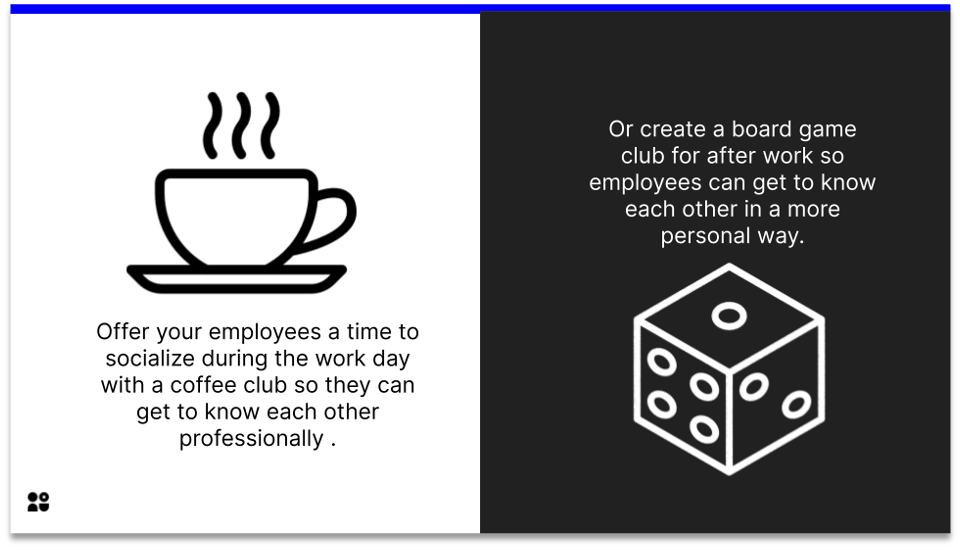
4. Employee recognition
Everyone loves a pat on the back when they do work well! However, when working remotely, those pats just don’t quite reach the shoulder – usually by a fair few miles. If you’ve not already got a system in place, you should research various platforms that offer recognition-giving capabilities.
Employee recognition is one of the pillars of a positive work environment. Accomplishments large or small that contribute to the goals of an organization should always be recognized. The benefits of doing so, just to name a few, include increased employee morale, motivation and engagement. In fact, recognition and rewarding employees was found to be one of the biggest drivers of overall employee engagement.

5. Treat all workers equally
If you have both office workers and remote workers, although their working environment may be different and their accessibility to communications different, this is not an excuse to pitch one group above the other. When an office culture makes exceptions for remote people, rather than embracing remote culture properly, it doesn’t work. The result is that one group ends up feeling left out.
This is why communication is so integral to teamwork, even more so when you have teams already divided amongst remote workers and office workers. Focus on making communications consistent so that groups that are in similar situations do not neglect others in the team.
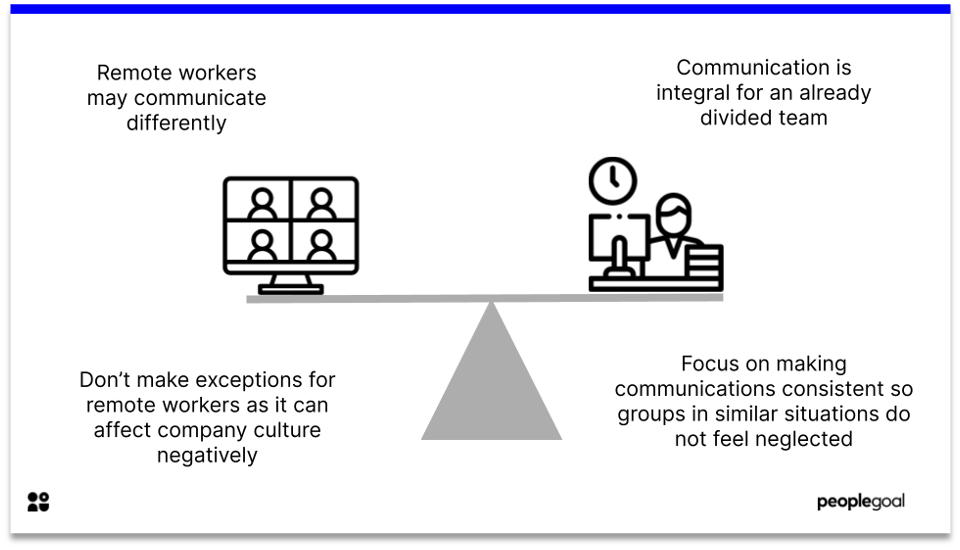
6. Delegate initiative as well as tasks
Every high-performing team has trust amongst their most valued sentiments. And when you’re managing a remote team it’s important not to just assign tasks to people, but to give them the opportunity to use their initiative and conduct their own work.
If you don’t give your team the opportunity to show initiative they may well start feeling like task monkeys. If you’re not willing to let your employees use their initiative with important work, try tasking them with something less high-pressure that requires they use their initiative, such as designing and running a team-building exercise for everyone to get involved in.
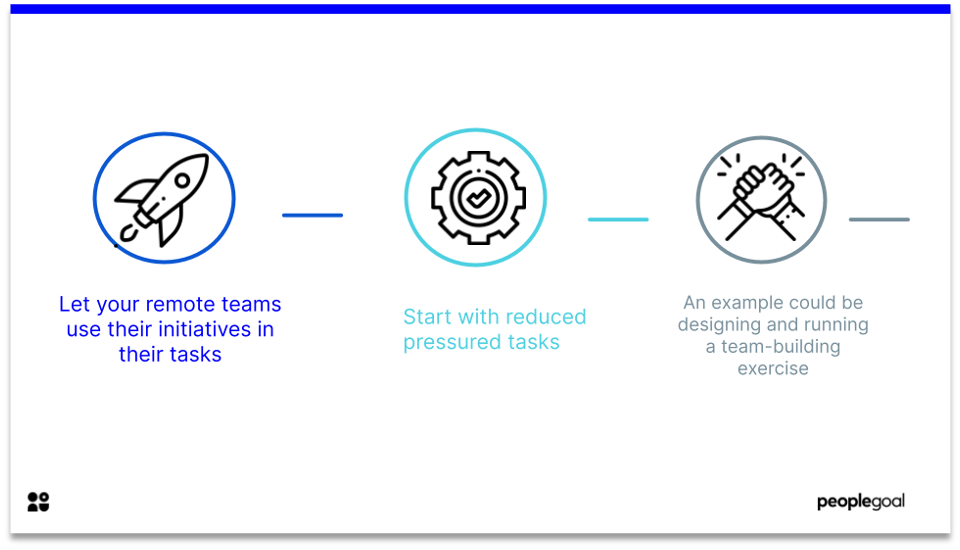
7. Utilize performance management systems
Every team has an end goal. The degree to which each individual is educated as to how to achieve that goal is clearly important to being successful. Therefore, it’s hugely beneficial to have a space where team members can check in on company objectives, department objectives, team objectives, and perhaps their own objectives to educate and re-educate themselves on what they need to do.
Having cascading goals visualized for remote workers is a fantastic way to show employees how and where their work is contributing to the success of the company. Not only does this motivate individuals, it also boosts productivity and efficiency.

8. Request regular feedback
Teams work best when individuals’ opinions are both voiced and heard. Chances are if you’re running a remote team for the first time you won’t have got everything right. And that’s okay. However, it’s not okay if you do not find out what went wrong, and even worse, not address the issues.
Ask each team member to provide feedback on the processes which you have implemented and on their peers’ work. This will provide you with the foundations to continuously improve the process for your future hires. It will also allow you to make any necessary adjustments to benefit the work you are conducting and your employees’ job satisfaction.
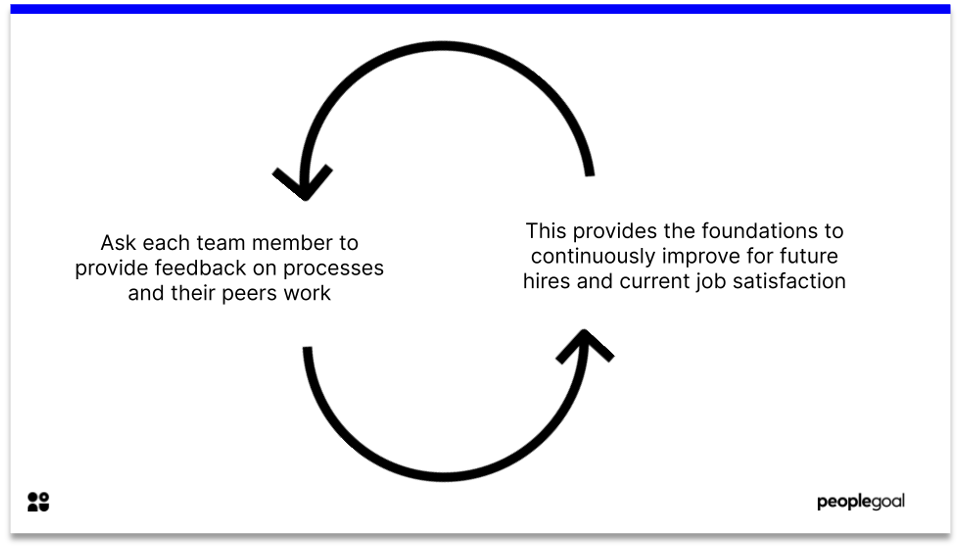
9. Create a safe space to work
Even though sitting behind a screen instead of in-person can give some people a bit more confidence (and the keyboard warriors too much confidence), some people will still need to be reassured of your organization’s environment of psychological safety. This can be done through behavior such as senior leadership showing humility, curiosity, fallibility and interest in their employees.
Leaders within a team should highlight that it’s okay to make mistakes, and that in order to progress, individuals should step forward and voice their ideas even if they may not be the right one for the job.
This can also be done structutally by asking teams to give constructive feedback that avoids blame and making things personal. This feedback should then be used to develop both individuals and teams.
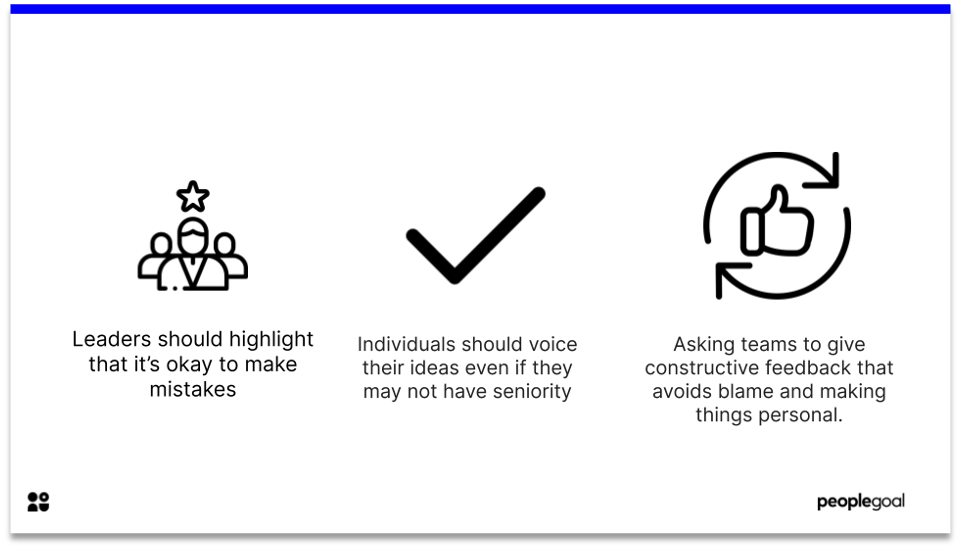
10. Define how you work together
Unless your organization has stipulated a strict remote working policy, many individuals will have different ideas about how to conduct remote work, whether that may lean towards a more flexible or rigid process. Therefore, having a dialogue with your team to assess the needs and expectations of all those involved is key to making sure that everyone is on the same wavelength. When employees know how others work, they are more likely to be emotionally connected and engaged which boosts both productivity and efficiency.
Teamwork: Build your remote teams
Promting teamwork in your companies teams is a sure way to increase motivation, productivity, and job satisfaction in your employees. It provides a way for individuals to feel as if they are apart of something more than just a job, increasing their loyalty to their colleagues and the company. We hope you have found some inspiration from our 10 ideas how to create a culture of teamwork in your remote teams.
Ready to 3x Your Teams' Performance?
Use the best performance management software to align goals, track progress, and boost employee engagement.




